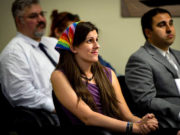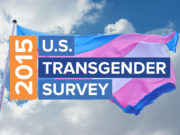I know my wig is convincing because I’m occasionally asked what I do with my hair. I get compliments about my hair regularly which is nice, but the questions about what I do to keep it that way are awkward. Invariably, I end up in a conversation that I can navigate but don’t really belong.
I’m a very good liar, and it’s easy to deceive when the person already believes something about you. Just let them believe it and use the language they expect. They will construct the deception for you more often than not. It’s so hideously simple and it works with observant, intelligent people. It’s easy to see how con artists make money.
But I digress. I work in a pub where I am out and proud as transgender. I benefit from an extraordinarily supportive boss and accepting people to work with. I also benefit from their policies in that if I find someone offensive, I’m in my right to tell them to can it or leave and the management will back me up without question. I occasionally rock up to work wearing a T-shirt that reads ‘I survived testosterone poisoning’, but only on special occasions like my one-year anniversary of starting HRT. Many of the regulars have seen my boy pics and know damn well my hair isn’t growing out of my head.
Still, a pub being a pub, you get the general public coming in and they clearly don’t know my history. They see a woman and grant me the cisgender privilege they grant everyone they see that largely conforms to gender norms. For my shame, I’m a pretty girly girl. It wasn’t just a transition phase; I wear skirts more often than not and make myself up. Bright colours, dressing on season trends… yeah, that’s me. I love all that stuff and it feeds the assumptions of those around me.
“Last week, a lady just started quizzing me about my hair.”
Last week, a lady just started quizzing me about my hair. Loved it, asked me if I’d ever dyed it crazy (hers was purple) and I found myself just chatting to her about hair. I don’t do much to my hair, I said (true), just put highlights in now and then (lie). I used to dye my hair at uni but I sorta stopped (true). Not actually sure why (lie) because I used to really enjoy it (true). And so on.
I could have just said it was a wig. I’m out at work; I didn’t need to lie. But I did. There are many possible reasons. I could have just not wanted to get into explanation mode. I could have been tired and busy so I was taking the path of least resistance. But really, I did it because I liked the automatic acceptance I was given. That’s what I want, right? That’s what we all want, isn’t it? We want people to just see us and accept what they see. I have that. Why on earth would I undermine it?
Except I felt like a fraud. I felt like I was steering this person’s honest enthusiasm in a direction that served me best and I didn’t like to think I was manipulating them. I wasn’t worried about being accepted should I come out and say, “Actually I don’t have any hair of my own.” I didn’t mind explaining. If there was some kind of issue from there, I had no problem throwing them out. I enjoyed their honest interest and felt like if I had told them the truth the conversation would have ended. I like the attention.

I was relating this to a transgender friend and she said she feels the exact same way when she gets into conversations about her children: pregnancy etc. That she has all the stories and was there, but feels she’s lying to people. She still does it because it’s expected and they’ve assigned her a role that is hers, even if she didn’t carry her children to term. She didn’t say, but on some level I think she feels the same as I do: she likes the acceptance and attention. She likes the belonging. And she feels bad about manipulating people, same as I do.
“The whole point of our transitions, the reason we all go to so much trouble, is to simply be and be accepted.”
In that moment of sharing, I realised that we were both letting our feelings cloud our appreciation for what we had. The whole point of our transitions, the reason we all go to so much trouble, is to simply be and be accepted. We are. As women, mothers, fashionistas. They see and accept. They ask because they respect what they see. We should honour that acceptance and respect. And if on the way we have to let people believe what they will…well, they were going to do that with or without our help.
We should take what we have, what is offered freely. We work so hard for it that I suspect we don’t trust it when we finally do have what we sought. We are not frauds for presenting as we are. We are not bad people because we let our presentation guide a conversation. To say that we are false for doing so is the same as suggesting that make up is false advertising on a dating site. My wig is not false advertising any more than my friend’s children are.
Am I engaged in a deception? In a way. Does it matter? No. I am not false. I am me and I am being included – empowered. The best policy at this point is to take what is mine, enjoy it and work on my own feelings without troubling them. We always see the worst in ourselves. Perhaps we need these deceptions to stay sane and safe. Maybe, in order to be kind to ourselves, we need people to believe what we want them to believe.
































